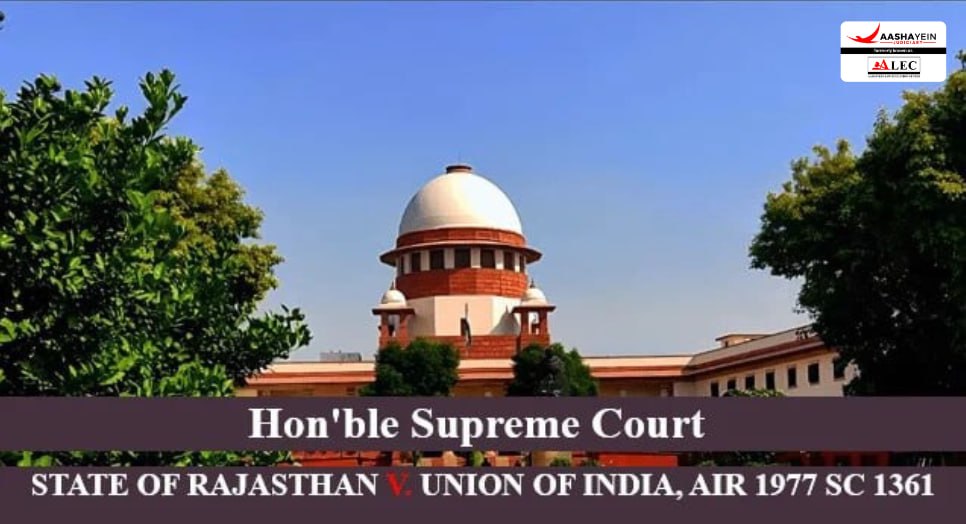Given federalism and the balance of power between the Union and State governments, this case is significant in Indian constitutional law because it discusses the extent and bounds of the President's authority under Article 356. Following the general elections in 1977, it investigates the constitutionality of the Central Government's orders to dissolve state legislatures and the subjectivity of the President's satisfaction under Article 356 to judicial scrutiny. Although the President's pleasure is subjective and often not susceptible to judicial review, the ruling made it clear that it may be questioned if it is shown to be dishonest or founded on unrelated factors. This case emphasizes the judiciary's responsibility to uphold the federal system and protect constitutional bounds.
Facts
In the 1977 Lok Sabha general elections, the Congress Party faced significant defeats in several states, while the Janata Party emerged victorious and formed the central government. Despite these losses, Congress-led state governments were still in power and had time remaining in their terms. The Central Home Minister, Charan Singh, sent letters to the Chief Ministers of these states, advising them to recommend the dissolution of their state legislatures to the Governors and seek a fresh mandate from the electorate. In response, the State of Rajasthan, along with several other states, filed an original suit under Article 131 of the Constitution against the Union of India. They requested the Court to declare the Central Home Minister’s directive as unconstitutional and illegal.
Issues
The issue in this case is whether the President's decision to impose or continue President's Rule in a state can be reviewed by the courts.
Petitioner’s Arguments
The case involved questions surrounding the President's power under Article 356 of the Constitution. It was argued that Legislative Assemblies could only be dissolved if both Houses of Parliament approved the President’s proclamation under Article 356. However, it was pointed out that Article 356 did not explicitly require approval by Parliament as a prerequisite for the President to dissolve State Legislative Assemblies under Article 356(1). Article 356(3) was cited to assert that the absence of parliamentary approval did not automatically invalidate actions taken under Article 356. The plaintiffs alleged that the Union Government’s threat to dissolve state legislatures was misleading and claimed that this exercise of power was mala fide, as it served a purpose not intended by the Constitution.
Respondent’s Argument
The Respondent contended that the decision to invoke Article 356 was not subject to judicial review, as determining whether a situation warranted its application was non-justiciable. It was further argued that the President’s final action could not be indirectly challenged by questioning the process leading to it. The Respondent also maintained that the Letter and the Law Minister’s Statement were consistent with Article 356, leaving no grounds for the plaintiffs to claim a cause of action. Finally, the Respondent argued that mere allegations or suggestions of facts were insufficient to justify the prohibition of conduct under Article 356.
Analysis of the Court
The Court held that the satisfaction required under Article 356 of the Constitution is subjective in nature and cannot be tested against objective criteria or judicially manageable standards. The Court concluded that it could not assess the correctness or adequacy of the facts or circumstances upon which the Central Government based its satisfaction. However, the Court clarified that if the satisfaction was shown to be mala fide or based on entirely irrelevant or extraneous considerations, it would have the authority to review the matter, as such satisfaction would not qualify as valid under Article 356.
The Supreme Court further ruled that a State Legislature could be dissolved without the President's proclamation under Article 356 being approved by Parliament. Such a proclamation would take immediate effect and remain valid for two months without parliamentary approval. The Court also dismissed the argument that a proclamation could not be issued while either or both Houses of Parliament were in session. Additionally, the Court held that even if Parliament disapproved the proclamation within two months, it would remain valid for that period. Furthermore, if Parliament neither approved nor disapproved the proclamation, any dissolved Assembly or dismissed State Government would not be revived.
In essence, the Court affirmed that it would not interfere with the Central Government's use of Article 356 merely because it involved political or executive policy considerations unless it could be shown that the President’s satisfaction was mala fide or based on entirely irrelevant or extraneous grounds

